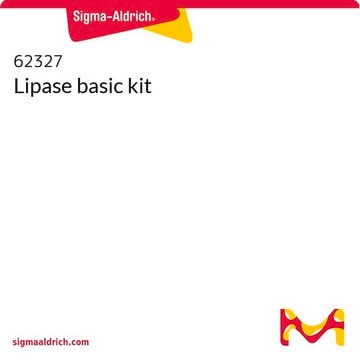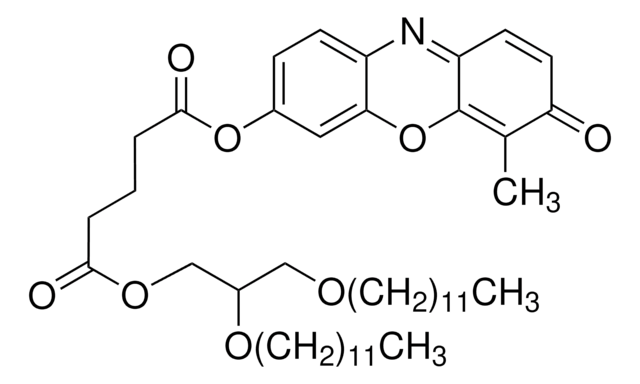MAK048
Lipase Activity Assay Kit III
sufficient for 100 fluorometric tests
Sign Into View Organizational & Contract Pricing
All Photos(3)
About This Item
UNSPSC Code:
12161503
NACRES:
NA.84
Recommended Products
usage
sufficient for 100 fluorometric tests
detection method
fluorometric
storage temp.
−20°C
General description
The lipase family of enzymes catalyzes the cleavage of the ester bonds of lipids. In mammals, this family includes many critical members including pancreatic, hepatic, endothelial, and lipoprotein lipase. Lipases, such as pancreatic lipase, are critical for the metabolism of lipids. Lipases also play key roles in processes such as cell signaling and inflammation. Measurements of lipase activity are commonly used to screen for pancreatic injury or disease, and to monitor diseases such as cystic fibrosis, celiac disease, and Crohn′s disease.
Application
- High-Temperature Short-Time and Holder Pasteurization of Donor Milk: Impact on Milk Composition.: This study evaluates the effects of different pasteurization methods on the composition of donor milk, focusing on its nutritional and biochemical properties (Escuder-Vieco et al., 2021).
Features and Benefits
Compatible with high-throughput handling systems.
Suitability
Suitable for the detection of lipase activity in biological samples including tissue, cells and serum
Principle
The Lipase Activity Assay Kit III provides a simple and direct procedure for measuring lipase activity in a variety of samples. Lipase activity is determined using a coupled enzyme reaction, which results in the generation of methylresorufin (λex = 529/λem = 600 nm) proportional to the enzymatic activity present. One unit of lipase is the amount of enzyme that will generate 1.0 μmole of methylresorufin from the substrate per minute at 37 °C.
Signal Word
Danger
Hazard Statements
Precautionary Statements
Hazard Classifications
Resp. Sens. 1
Storage Class Code
10 - Combustible liquids
Certificates of Analysis (COA)
Search for Certificates of Analysis (COA) by entering the products Lot/Batch Number. Lot and Batch Numbers can be found on a product’s label following the words ‘Lot’ or ‘Batch’.
Already Own This Product?
Find documentation for the products that you have recently purchased in the Document Library.
Customers Also Viewed
Varsha Patil et al.
Frontiers in microbiology, 12, 722229-722229 (2021-09-21)
Mycobacteria such as Mycobacterium tuberculosis, the causative agent of tuberculosis that annually kills several million people worldwide, and Mycobacterium smegmatis, the non-pathogenic fast-growing mycobacteria, require oxidative phosphorylation to meet their energy requirements. We have previously shown that deletion of one
Raymond Rubianto Tjandrawinata et al.
Frontiers in microbiology, 13, 825251-825251 (2022-03-18)
The anti-hypercholesterolemic effect of 11 Lactobacillus isolates was investigated in vitro by measuring remaining cholesterol in growth media, growth ability in media supplemented with cholesterol, and BSH activity. Among the selected isolates, DLBSH104, DLBSH122, and DLBSK207 have demonstrated outstanding potential
Lin Zhu et al.
Diabetes, 67(12), 2494-2506 (2018-09-15)
In clinical trials, inhibition of cholesteryl ester transfer protein (CETP) raises HDL cholesterol levels but does not robustly improve cardiovascular outcomes. Approximately two-thirds of trial participants are obese. Lower plasma CETP activity is associated with increased cardiovascular risk in human
Our team of scientists has experience in all areas of research including Life Science, Material Science, Chemical Synthesis, Chromatography, Analytical and many others.
Contact Technical Service






